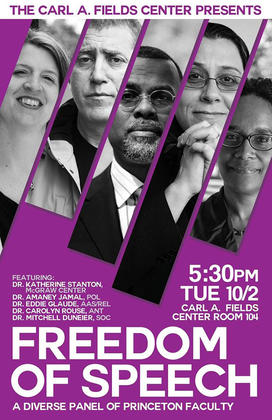Princeton Professors Discuss Free Speech
An event titled “Freedom of Speech: A Diverse Panel of Princeton Faculty” lived up to its name Oct. 2 as five faculty members disagreed sharply on issues that included academic expression and so-called safe spaces.
Taking part were Eddie Glaude *97, chair of the Department of African American Studies; politics professor Amaney Jamal; Mitchell Duneier, chair of the sociology department; Carolyn Rouse, chair of the anthropology department; and Katherine Stanton, senior associate director for teaching initiatives and programs at the McGraw Center. About 70 to 100 people attended the panel at the Carl A. Fields Center.

“The University tends to tilt more to the left than the right,” Duneier said. “Controversial speakers should not be stopped from speaking, and disruption of the speech itself should not be condoned.”
Stanton approached the concept of free speech from the perspective of classroom instruction. “I advocate a teaching practice in which we encourage students to tolerate false steps,” she said. “A teaching practice in which we acknowledge the difficulty of thinking.”
Glaude, Jamal, and Rouse all raised concerns about the application of free speech to universities and criticized portions of Professor Keith Whittington’s book Speak Freely, this year’s Pre-read. “What [Whittington] labels as free speech actually is a method of inquiry that he commends,” Glaude said, describing this method as the scientific exchange of ideas.
Glaude argued that universities are not as left-leaning as some might think. “Thousands of lectures across the ideological spectrum happen on college campuses in this country every day,” he said. “The university setting is perhaps the most vibrant space for the free exchange of ideas in the country.”
But he said that some might take advantage of the University’s commitment to the free exchange of ideas. “What do we do when people weaponize our norms?” he asked, recalling “the torch-bearing Nazis marching in University of Virginia” who add little to university debates while espousing views of white superiority. “How would I argue with someone who believes that white people are superior to me?” Glaude asked.
“Universities have to protect the actual conditions that accord everyone equal standing and dignity,” he said. “This is what makes for the free exchange of ideas in our community.”
Jamal suggested that free speech ultimately works against minority students. “Power matters, and the way power is distributed does not advantage minorities,” she said. “This idea of free speech is to secure privilege for those who are already privileged.”
Rouse argued that there is no such thing as free speech: “Societies cannot maintain themselves if people just say whatever is on their mind at any time,” she said. At universities, she added, “there is so much control of speech because that is what makes us legible.” However, she argued that the Princeton community should continue to strive towards the ideal of free speech, “with caveats.”
“I tell my students: This is not a politically correct environment,” Glaude said. “You can say whatever you feel or think, but know that you will be held to account.”
Whittington and Rouse were scheduled to discuss “How do we balance free speech with civility” as one of the many sessions of the She Roars alumnae conference on campus.











1 Response
Norman Ravitch *62
7 Years AgoFree Speech Is Never Easy
I taught at one of the less troubled Univ. of California campuses from 1962-2000. We had of course the Berkeley Free Speech Movement, the Vietnam War, Watergate, the Reagan presidency for which we had been prepared by the Reagan governorship in California, and the OJ trial. Lots of political, racial, and other sources of speech, free and otherwise. I at times became a victim of leftist faculty malice, and I know others in the same boat. I also know of malice from conservatives. It is hard to maintain free speech when most people, even on campuses, believe in free speech if it agrees with them. Today, some on the right are exaggerating the degree of leftist domination, while leftists are very quick to claim there is no leftist domination. Outside of esoteric scientific fields, there has been and remains a great deal of difficulty in expressing oneself freely. Many people are totally predictable. When I see and hear Professors Eddie Glaude and Julian Zelizer on MSNBC or CNN, I know exactly what they are going to say. That is too bad.